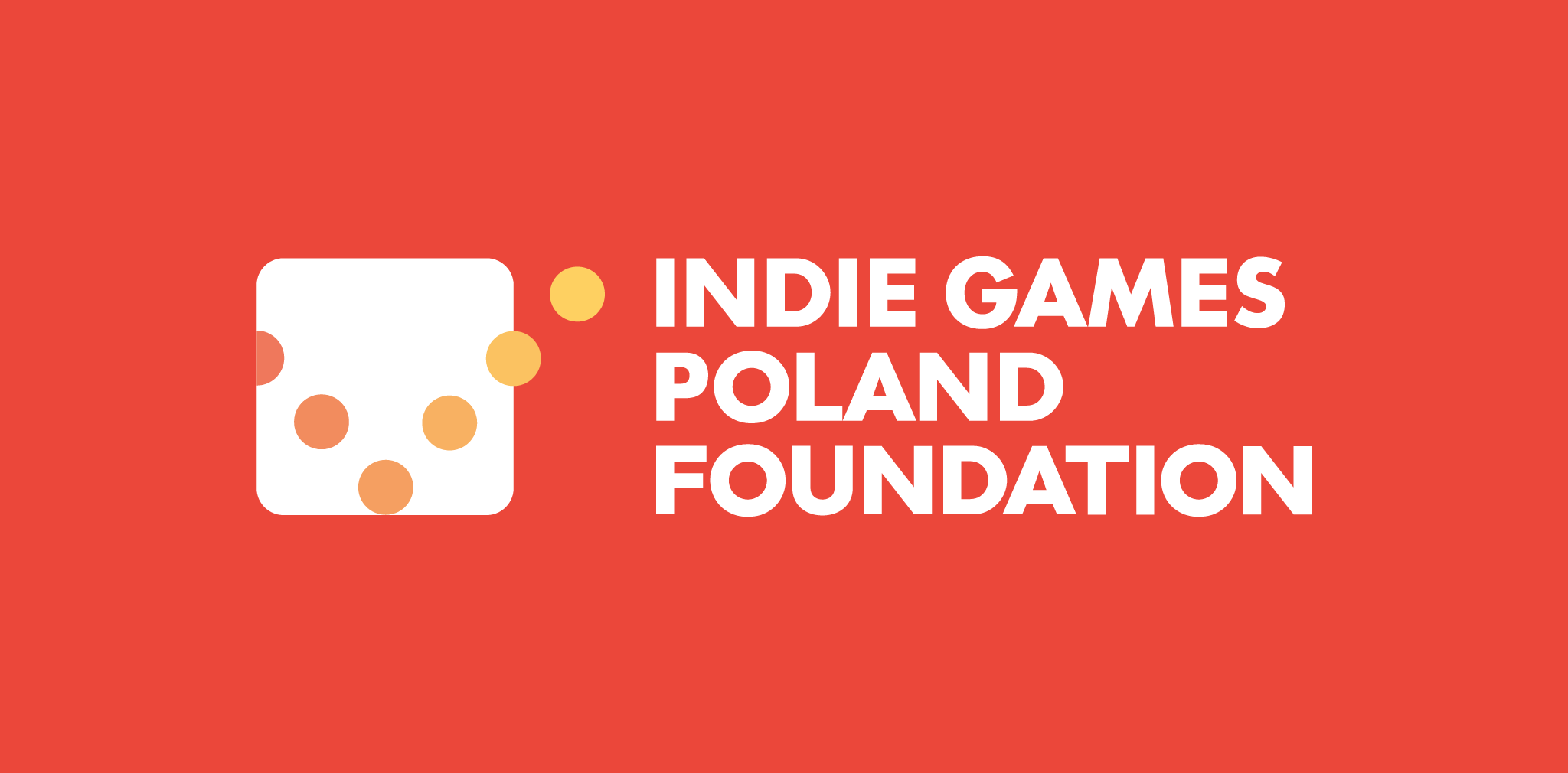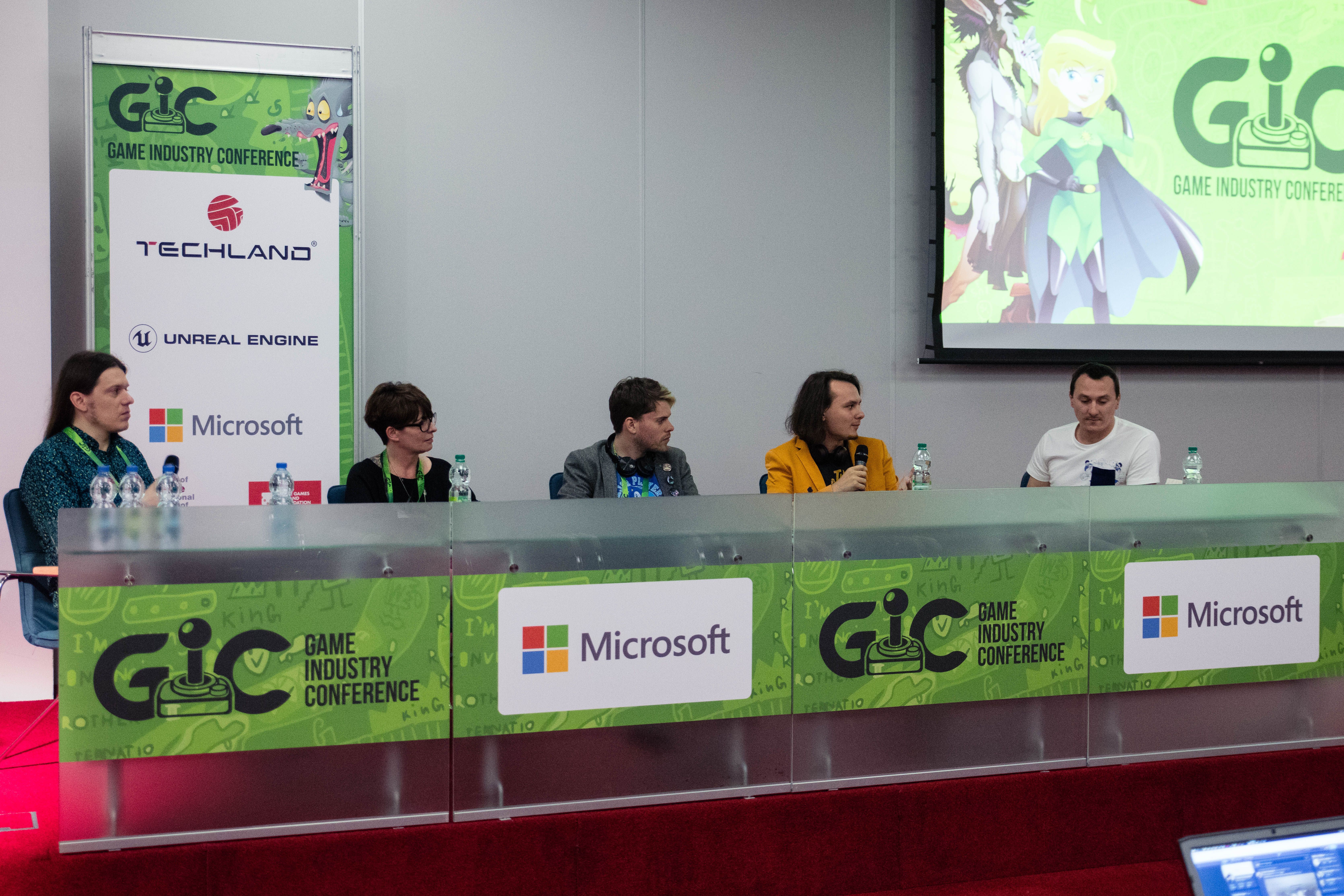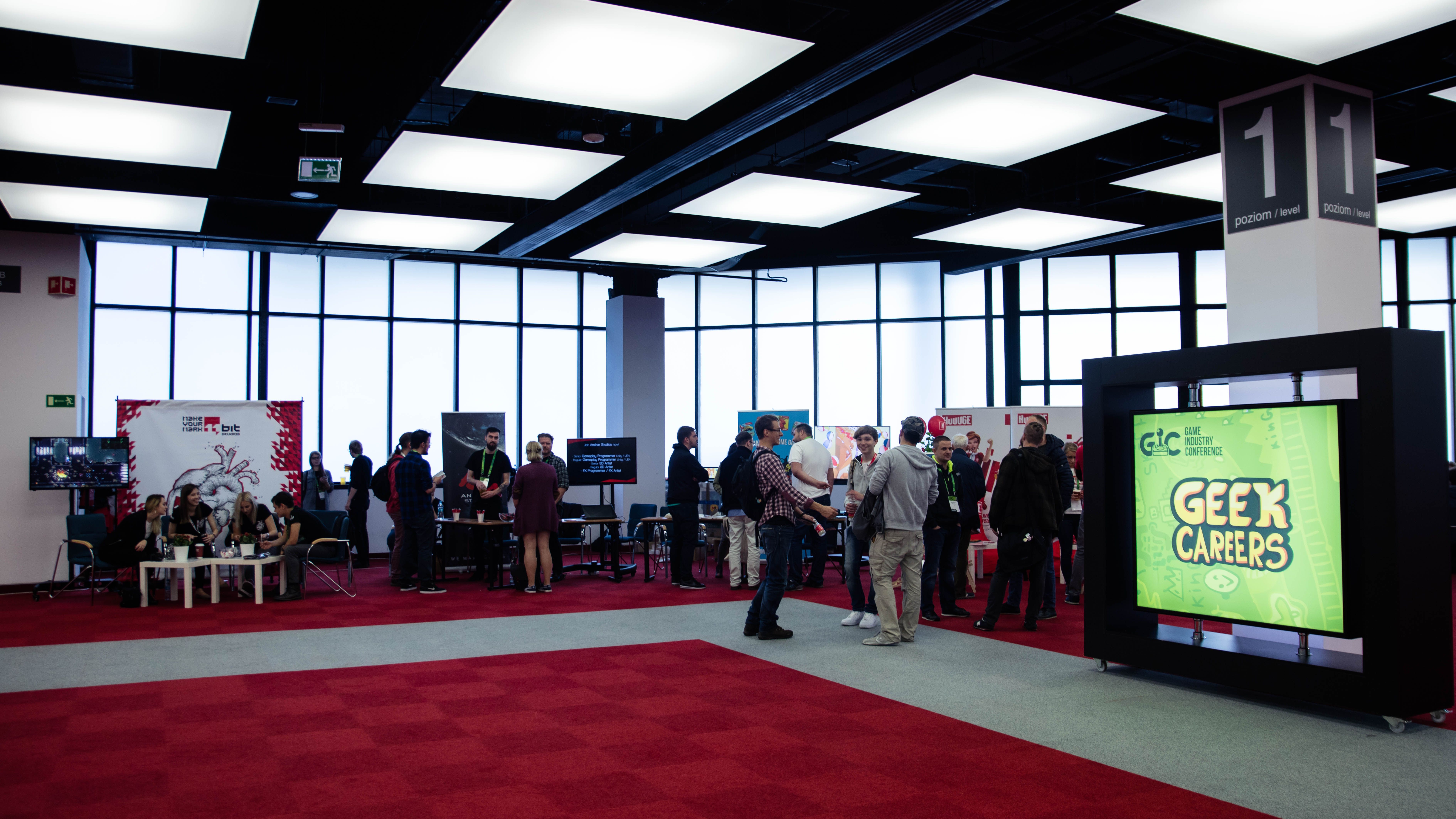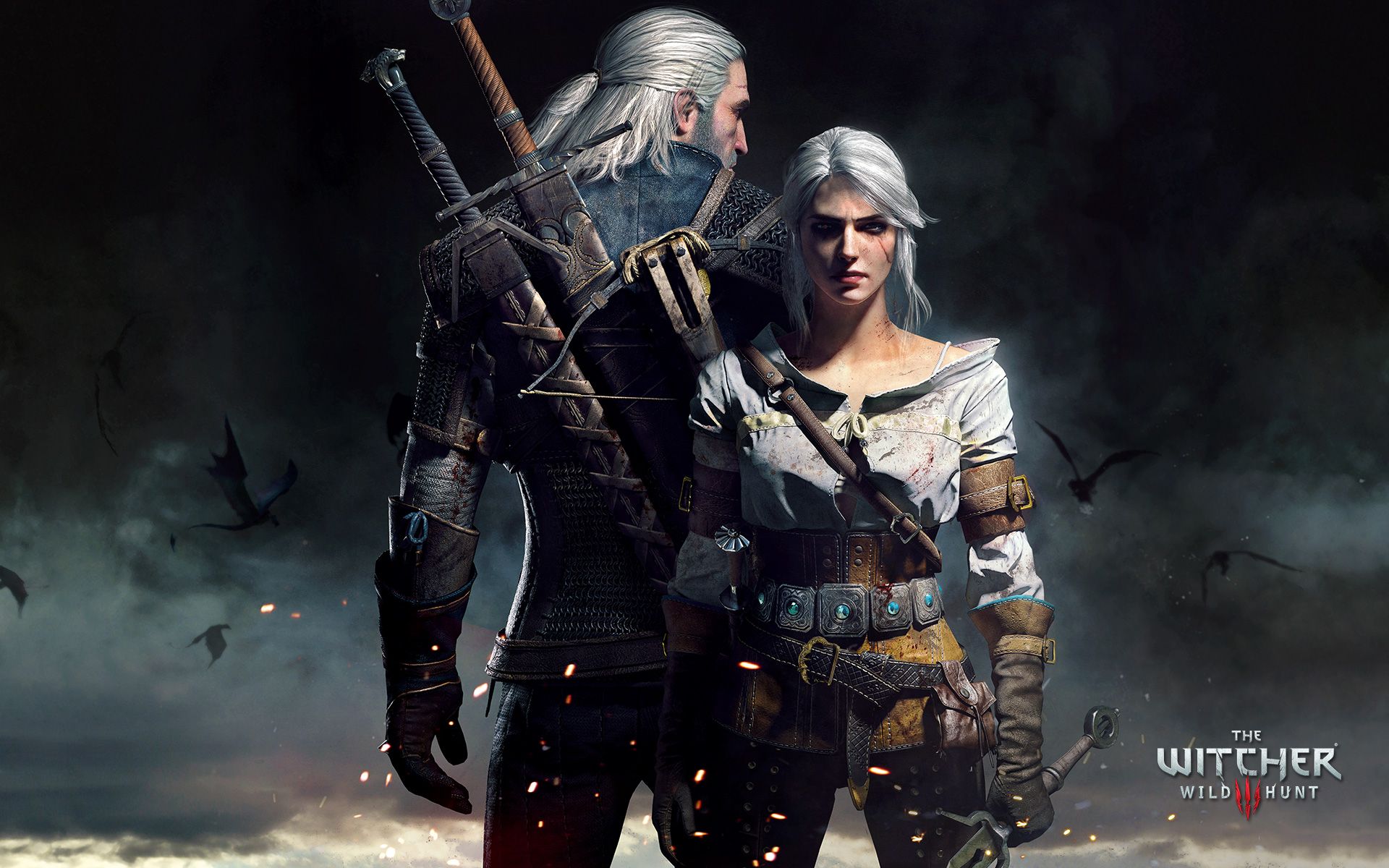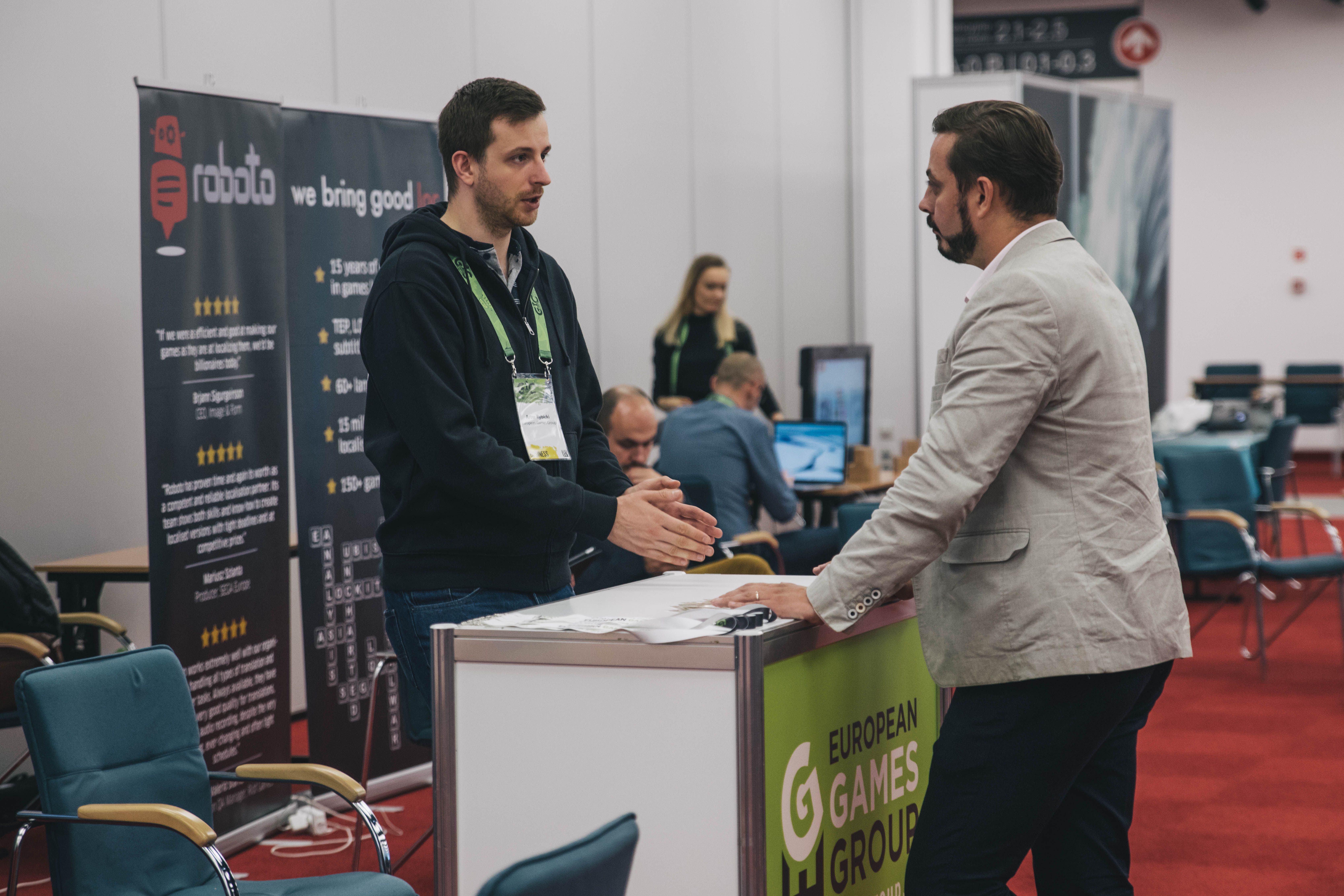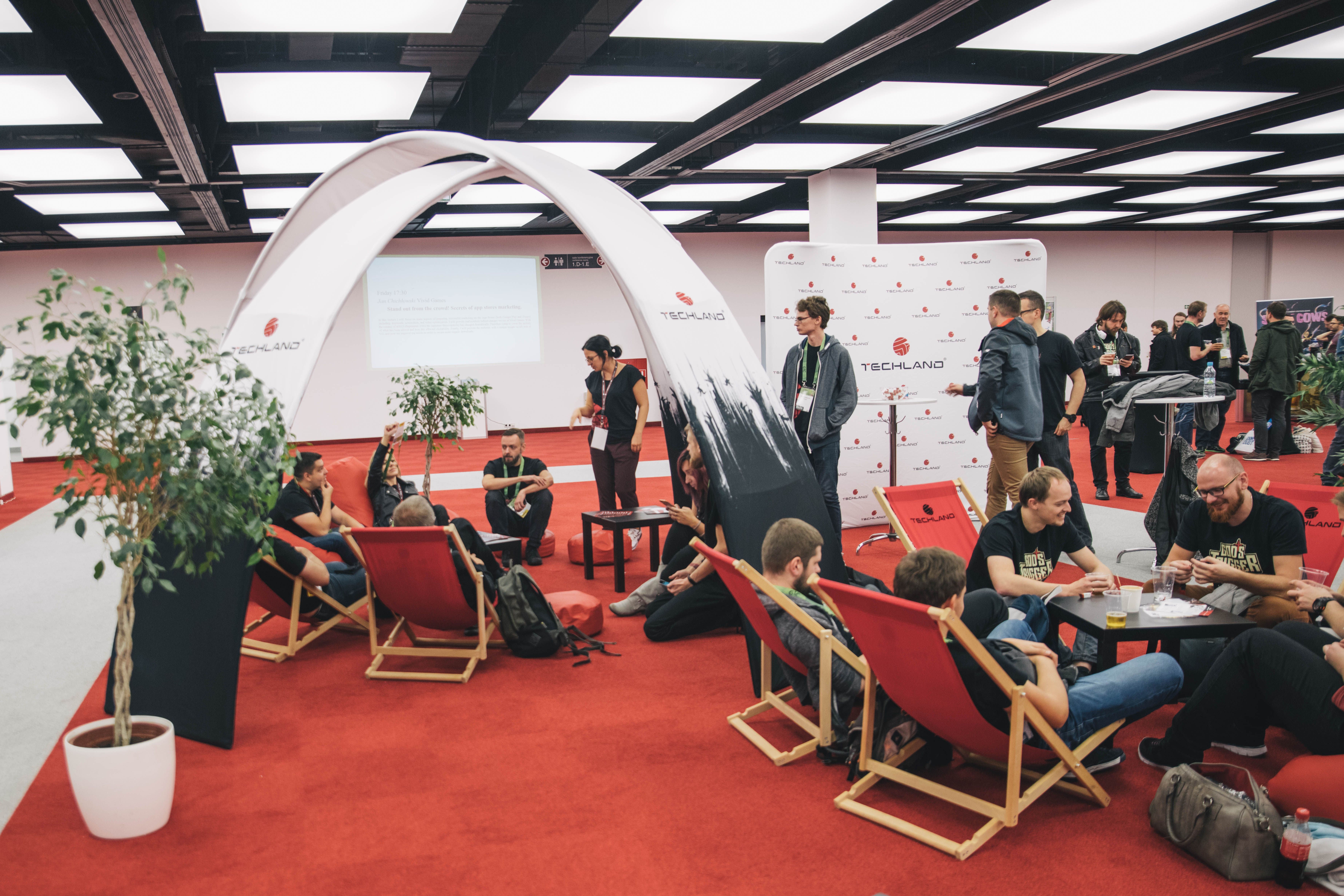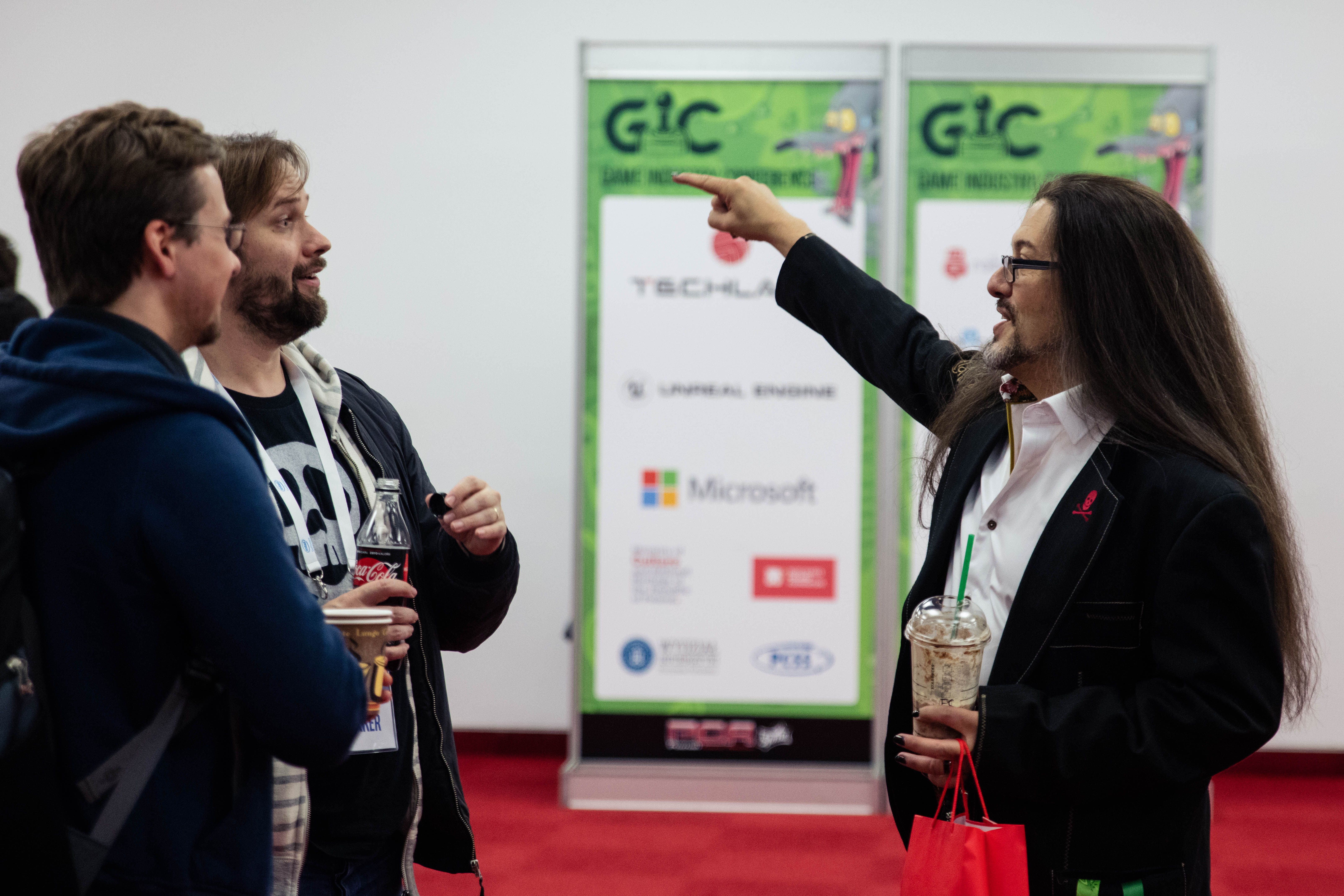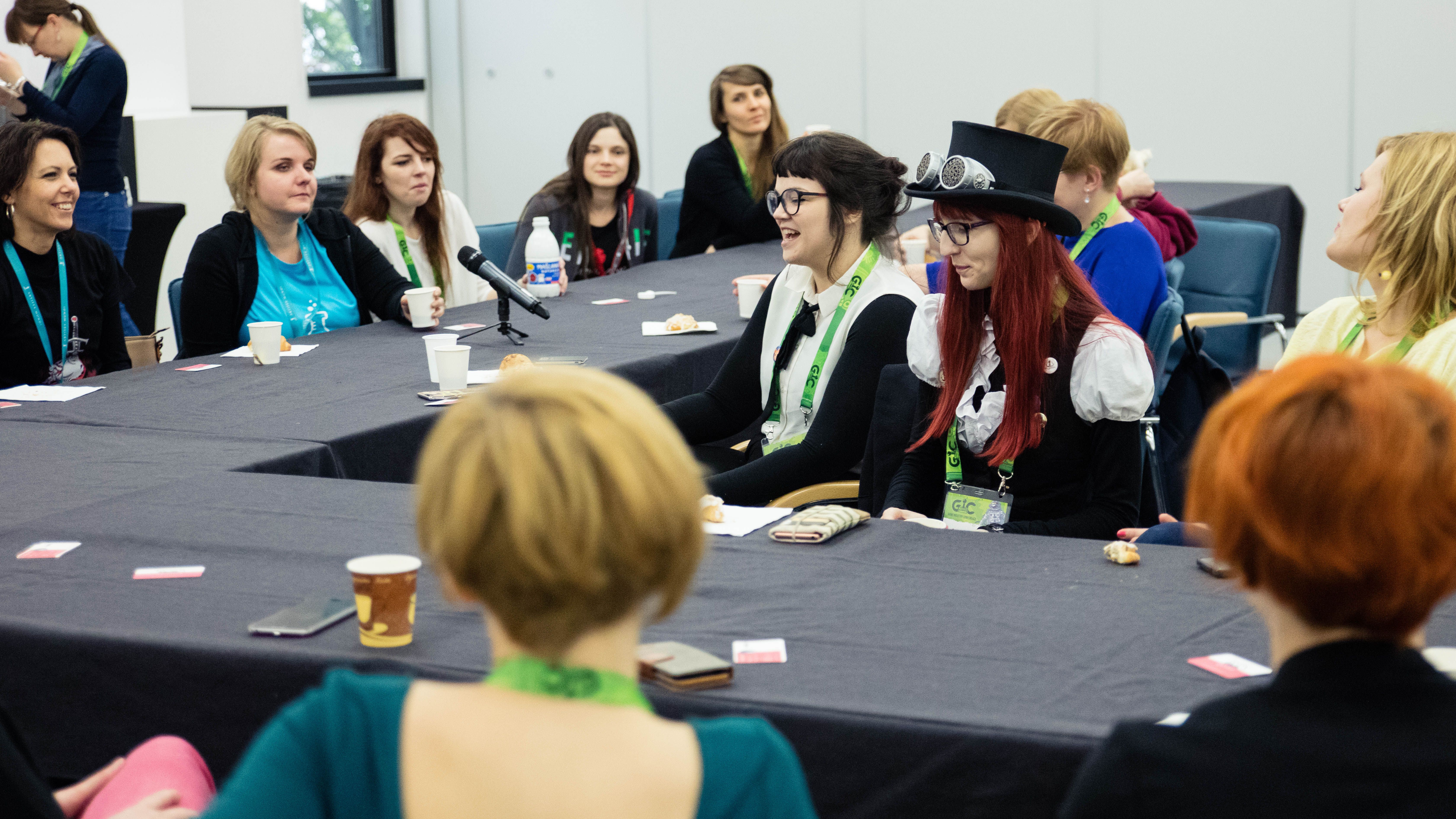Poland is on its way to becoming a huge contender in the video game market. The success of Polish games like The Witcher 3: Wild Hunt, Dying Light, and 60 Seconds! make the market stand out in both Eastern Europe and worldwide. For the past few years, a pair of gaming events have gone on in Poznan: Game Industry Conference (abbreviated as GIC), and Poznan Game Arena.
While Poznan Game Arena is a large event open to the public where both indies and larger companies like Microsoft and Nintendo showcase their new and upcoming games, GIC is a more developer and industry focused event where developers can network and go to things like roundtables and seminars.
This year I was flown out to Poland by indie developer Robot Gentleman to check out their new game 60 Parsecs!, and was able to check out Poznan Game Arena and GIC for myself. While at GIC, I had the chance to chat with Jakub Marszałkowski (pictured the furthest left below), Conference Chair of Game Industry Conference and Co-Founder of Indie Games Poland Foundation, a Polish NGO dedicated to helping Polish indie devs create their games and expose them to a worldwide market. While talking, we were able to discuss what his organization does, the current state of the Polish gaming scene, and what he sees coming in the future for the industry.
Tomas Franzese: For those who don’t know, could you give a brief introduction of Indie Games POLSKA Foundation?
Jakub Marszałkowski: Indie Games POLSKA or Indie Games Poland, however you prefer it, was started two years ago. It was a grassroots process; several people from the industry in Poland found out that we actually didn’t have any developers organization or industry organization here. It might sound funny, in the US you have had IGDA for how many years now? There was nothing like that in Poland, and still at that point the industry was doing well, but maybe it could have been doing better if there was something that could help.
At that point, we approached the Polish government, who were like “Yes, there are people in the ministries that would like to help, but there needs to be somebody to work with, some official organization.” Then we decided to do it that way. That was at the end of 2015.
T: So the Polish government was very supportive in the setting up of this organization?
JM: Setting up the organization was a technical need, but yes, the government was looking at game producers. We do have a big industry, it is an important part of our exports, and even more important part of our cultural exports. Games are culture, we don’t have to debate on that, and Polish games are being played worldwide, which means that those parts of Polish culture that get into those games are perceived worldwide.
I think this was convincing for the government. Then obviously also The Witcher is making views change because it is so huge and visible, but there are many other games and studios that are underseen. We have an industry that now has some 400 studios doing games. When we were starting we could show a list of at least 250 that we knew were on the map. So putting all of that on Witcher would probably be unfair to the other 249 studios also selling games.
The government, yes they are willing to help. Maybe we need a bit more time to organize it more properly, we see today’s projects as only the beginning. There are some things that still may be organized a little bit too ad hoc, we are learning how to cooperate. Again, it is only two years now.
But then sometimes I’m approached by people from other countries and other organizations, and they tell us how good we have it with all of this government support. Depends on point of view, I would say. I’m strongly convinced that more support is available for example in the United Kingdom, Nordic countries, Germany, not to forget Canada. The new pieces of support that emerged in Poland recently are still not that scale and it has only been two years. The western part of Europe usually supports the game industry quite well. Even the smaller countries that don’t have that large of an industry like Switzerland for example. I am in deep envy of the government support they have there.
Then there is Eastern Europe. Poland might be some kind of leader in here, with the biggest industry and support, so when I talk with people from some other places in Eastern Europe and they express envy for Poland, I can probably trust them, because they usually have nothing or close to nothing of the government support, we have.
This leads us to co-operation initiative we signed yesterday. I hope that other countries: Croatia, Czechia, Slovakia, Hungary, and Moldova, will be able to show to their politicians, that what Poland does, they could have too. There are some first approaches like there was the first Czech stand with governmental help at Gamescom this year, but it could go farther.
T: So was that agreement a pledge of support from your foundation to those other countries?
JM: We would love to if only we can secure funding for that. But I believe it will be more mutual. Some of those industry organizations are older than IGP, and they are doing their own awesome work. I would say it was six peers, six equal bodies, signing the first formal document saying that we want to cooperate, what the aims of the operation are, and what we are looking for. It’s also not that we are not cooperating. Only Moldova is really new in this group as we only got connected with them this year, but with Czechs, with Croatians, with Hungarians, we have some cooperation ongoing already. But we hope that with the agreement, we can bring it to another level.
T: If you had to choose a couple of the more standout independent developers from Poland that have broken out in the past couple of years, who would those be?
JM: Probably the most recognizable one is Sos Sosowski, who is kind of our indie superstar with his crazy games, his crazy style of being. And he is everywhere at events, so he is very visible. Then, probably one of the biggest here would be SUPERHOT Team, which I particularly love as the game was originally designed at a Game Jam. Then they spent some year-and-a-half showing the game at events, getting feedback, getting visibility. Then they did KickStarter and fund themselves and later get some extra money from investors to make the game even better. Then they finally released it, and I would say it’s closing in on 1 million copies sold right now, at a quite high price level. So it is a very nice story. It is also one of very few VR games that are truly VR like the VR version changes something in the gameplay and makes a real difference.
Sometimes there are things that we are overseeing for many reasons. Yesterday at GIC, I was talking with the guy that did Yet Another Zombie Defense. A small zombie defense game priced quite low at $2 on Steam, but it sold half-a-million copies. It’s very nice to have half a million players playing your game, I bet most indies would go for that.
On the completely other end of this story, everyone in Poland is independent. We have no single studio like Ubisoft subsidiary or anything similar here in Poland. Everyone up to the biggest companies, up to CD Projekt Red, claim to be independent. They are not owned from outside of Poland or owned by some big companies. I would say that is quite unique for our industry, and it brings up the debate: Who’s indie and who’s not indie? If you are independent but you have 80 people doing a nearly AAA game are you indie or are you not? I personally use the term Indie Plus to describe those. But this is also the ace of the industry in Poland, this is how it works.
T: Do you think that ability to stay independent has allowed the Polish industry to foster more creativity?
JM: We are sometimes discussing what is making our industry so successful, but I never really thought that it might be this reason. Maybe you are pointing out something very interesting. It’s difficult for us to find clear factors that are causing the success of the Polish Game Industry. I can point to some.
I know we have excellent specialists. Myself, I’m teaching at the Poznan University of Technology at the Computer Science department and I know that the students we are sending to market are specialists and are excellent. That’s definitely not enough though, that may just be one of the factors. We think we are hungry for success in Poland in many ways that some richer countries are not.
I’m sure we are more hardworking in Poland because we are still developing. It’s normal for people to do more overtime, especially indies, as that’s the way indie stuff works. The funny thing with Game Industry Conference, for example, is, that here we have some clash of cultures. When I am talking to people from the west to get them to come to the conference, and when I say to them it is on the weekend they are surprised. They would prefer to leave the conference on Saturday morning and go home to spend time with family, and I understand that.
But then when I am talking to Polish people, they would prefer to come to the conference on Saturday morning or maybe Friday evening. When they finish their Friday day of work, then they want to go the conference and spend their weekend there because they want to work five days. So we have people that want to leave on Saturday and people that want to come on Saturday. I would say this is a bit characteristic for Eastern Europe, as I see it at least. We work more.
Then the independence, that’s an interesting point. It is definitely working for CD Projekt Red, which will publish a game when it is ready to be published. They don’t have this urge to publish a title every year. I know it is also used by a couple companies that are a bit underlooked here like Techland, their Dying Light is of very nice quality, and now they are working in quiet on other titles and they are not rushing things. And there is nobody from the outside that is rushing them, so yes, maybe this independence is really working.
T: How has GIC been running so far this year?
JM: I’m a bit surprised myself how it grew because I remember this event when it was still a student's event a few years ago. It was already very big and very successful two years ago and a year ago, but again this jump forward we are having this year is tremendous. It’s really, really great to see.
We are trying to organize things in a bit of a different way, I think unique and good way. Our main goal with the conference is to have it accessible. The conference is not really behind a pay-wall of some expensive tickets that people can not afford. The backbone of the conference is that every person that has a ticket for the expo, which is around 8 Euro, can come to the conference and attend at least all of the talks. There are plenty of attendees that are buying dedicated GIC tickets that cost a bit more, but also offer a bit more.
At the same time, it is very important to have this knowledge sharing, and in this group that is coming on expo tickets, obviously, there are students. Knowledge should be really accessible for them.There are even younger people that maybe will be choosing their career path, and if they can attend the talks and see world-class specialists giving talks, it might help with their choices, so they will do games in the future. That means we do a good job here, right?
Then we see among those people who are using expo passes to access the conference the professionals, and that’s still perfectly good to us. We want to have a really accessible event.I’m quite happy this year with the quality of talks we are putting out. We did a lot in working with speakers on their talks, not just inviting names and letting them talk about whatever they wanted.
We have a very nice advisory board that is helping us with that. We have done dozens of reviews of talks and I would say at least half of the speakers were forced to improve their submissions in the process, and I’ve seen some talks change so miraculously after the review when the speaker was willing to satisfy the suggestions of the board. It’s awesome, if you put effort on the talks you will have, you will have really great talks.
Then they are also meeting people and networking, making business partners. I think it is working, people are saying it is working. I do not know how exactly the career zone looks right now, but there are five companies recruiting and I hope it is also working for them.
T: Do you see any big changes coming to either GIC or the Polish gaming scene in the next couple of years?
JM: Let’s start with the Polish indie scene. I think the changes are similar to the changes everywhere. I know developers know we are in a, I don’t want to say difficult, but some special moment. Everyone is expecting that something will happen soon. I would say expectations and the morale around it are similar. The industry is growing at a tremendous pace, with more and more studios and games. Many of them will fail and not sell that well, but we see that worldwide also. There are so many games developed, that simply not all of them can succeed.
Then as Indie Games Poland we will try to do even more work to help developers. We are talking with politicians.We even had some nice meetings yesterday here at GIC. We aim for new ideas on how to support the developers in Poland. But it is too early to share any details.
Regarding GIC, we are trying to do some new things every year. Each year there is some new experiment that we are trying to polish in next editions. Last year we did the Career Zone for the first time. It was very nice, we are continuing that and it will be better and better every year. This year there were two new things.
First, Roundtables; there is one actually happening in the next room. It’s the first time we are doing them so I’m assuming we will have to learn a lot and will have great Roundtables next year. I would say it is very important with events to learn from one edition to the next.
The second new thing we did this year is providing more inclusiveness programs.We want this event to be as accessible as possible, to include everyone, to help people access it. For example, we started for the first time our Inclusiveness scholarship. We sent out a call for that, people applied, and they were getting free Business Passes, with full access to the conference. They are also getting accommodation on our expense, indie hostel style and all meals.
They have to cover only the cost of travel to the conference. We are doing this for the first time, we see some things we need to learn from, and I definitely want to do it bigger and better next time. Even looking at the regions we got applications from I see that support is necessary. Places like Ukraine, Moldova, Turkey, and Egypt probably do not have it better than Poland, so maybe we should help developers from there, any way we can. We will also probably have some crazy new idea again for next year that I do not see yet but will come to us eventually.
T: Is there a particular reason Poznan, Poland is the hub for GIC.
JM: It’s very simple: Poznan is the expo city in Poland. Something like Cologne in Germany. This is the biggest expo company and biggest expo grounds in Poland and probably in this part of Europe. All of the big expos are held here. The Poznan Game Arena is the second biggest expo in Poland with only the Motor Show being bigger. Both of them are here, organized by the International Poznan Fair. Then GIC together with Poznan Game Arena, is working very nicely. We have good cooperation, and there is a valuable symbiosis between B2B and B2C events. It’s that simple.
You may expect that it should be in Warsaw or something, but Warsaw also has no expo grounds really, so you can not make a big expo in Warsaw. There is also one more funny observation as an organizer. People that are going to an event that is in a city they are in living in, they tend to be poor event attendees. They just want to come for a moment and then go back home to work or family.
The people that are coming to an event in another city make better event attendees. So yes, there is more of Polish game industry in Warsaw, but moving them from Warsaw to Poznan causes them to spend three days on the event, instead of coming for two hours here and two hours there.
T: Is there anything else you’d like to highlight about Indie Games POLSKA?
JM: To sum it up, it’s a bunch of crazy people who working pro bono to help the industry. We also invite your readers to visit us at some point, because we are also bringing Polish developers to trade shows all around the world from PAX West Seattle to Tokyo Game Show. So if you are at a trade show, please look for the Indie Games POLSKA stand and play some Polish games.
GIC and Pozanan Game Arena took place from October 6 to October 8. If you want to hear about a couple of the games we checked out at the event, be sure to read our previews for 60 Parsecs! and Tower 57.

